酒店英语培训方案
国际酒店英文培训计划方案
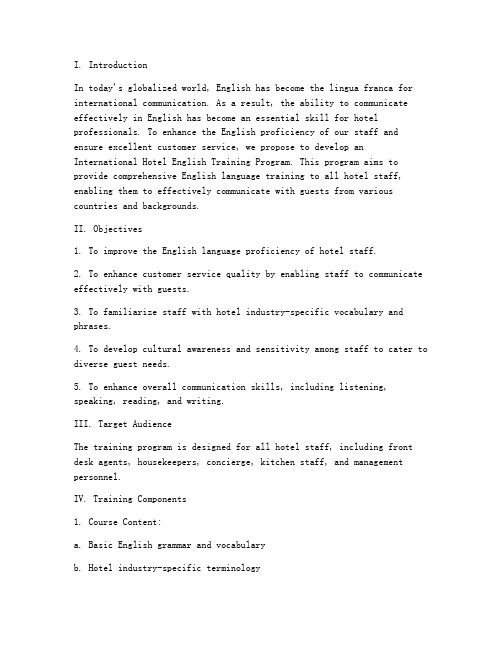
I. IntroductionIn today's globalized world, English has become the lingua franca for international communication. As a result, the ability to communicate effectively in English has become an essential skill for hotel professionals. To enhance the English proficiency of our staff and ensure excellent customer service, we propose to develop anInternational Hotel English Training Program. This program aims to provide comprehensive English language training to all hotel staff, enabling them to effectively communicate with guests from various countries and backgrounds.II. Objectives1. To improve the English language proficiency of hotel staff.2. To enhance customer service quality by enabling staff to communicate effectively with guests.3. To familiarize staff with hotel industry-specific vocabulary and phrases.4. To develop cultural awareness and sensitivity among staff to cater to diverse guest needs.5. To enhance overall communication skills, including listening, speaking, reading, and writing.III. Target AudienceThe training program is designed for all hotel staff, including front desk agents, housekeepers, concierge, kitchen staff, and management personnel.IV. Training Components1. Course Content:a. Basic English grammar and vocabularyb. Hotel industry-specific terminologyc. Customer service and communication skillsd. Cultural awareness and sensitivitye. Practical scenarios and role-playing2. Training Methods:a. Classroom instructionb. Interactive workshopsc. Role-playing exercisesd. Case studiese. Online resources and self-study materials3. Training Schedule:a. Duration: 3 months (1 hour per day)b. Mode: Face-to-face training with online supportc. Evaluation: Regular quizzes, assignments, and a final examinationV. Training Materials1. Textbooks and workbooks2. Online resources (e.g., language learning platforms, podcasts, videos)3. Handouts and supplementary materials4. Role-playing scripts and scenariosVI. Implementation1. Identify and recruit trainers with expertise in hotel English and communication skills.2. Develop a comprehensive training curriculum based on the identified objectives and target audience.3. Conduct a pre-training assessment to gauge the current English proficiency of staff.4. Schedule training sessions and allocate resources.5. Monitor progress and provide feedback to staff.6. Conduct a post-training assessment to measure the effectiveness of the program.VII. Evaluation1. Pre-training and post-training assessments to measure the improvement in English proficiency.2. Feedback from participants regarding the training content and methods.3. Customer feedback on the quality of service provided by trained staff.4. Regular progress reports to ensure the program is on track to achieve its objectives.VIII. ConclusionThe International Hotel English Training Program is designed to enhance the English language skills of hotel staff, ultimately improving customer service quality and guest satisfaction. By implementing this program, we aim to create a professional and welcoming environment for guests from all over the world.。
酒店英语培训100天计划
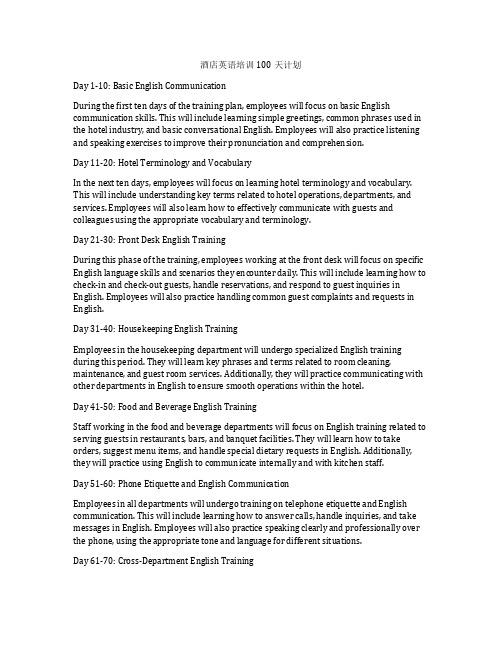
酒店英语培训100天计划Day 1-10: Basic English CommunicationDuring the first ten days of the training plan, employees will focus on basic English communication skills. This will include learning simple greetings, common phrases used in the hotel industry, and basic conversational English. Employees will also practice listening and speaking exercises to improve their pronunciation and comprehension.Day 11-20: Hotel Terminology and VocabularyIn the next ten days, employees will focus on learning hotel terminology and vocabulary. This will include understanding key terms related to hotel operations, departments, and services. Employees will also learn how to effectively communicate with guests and colleagues using the appropriate vocabulary and terminology.Day 21-30: Front Desk English TrainingDuring this phase of the training, employees working at the front desk will focus on specific English language skills and scenarios they encounter daily. This will include learning how to check-in and check-out guests, handle reservations, and respond to guest inquiries in English. Employees will also practice handling common guest complaints and requests in English.Day 31-40: Housekeeping English TrainingEmployees in the housekeeping department will undergo specialized English training during this period. They will learn key phrases and terms related to room cleaning, maintenance, and guest room services. Additionally, they will practice communicating with other departments in English to ensure smooth operations within the hotel.Day 41-50: Food and Beverage English TrainingStaff working in the food and beverage departments will focus on English training related to serving guests in restaurants, bars, and banquet facilities. They will learn how to take orders, suggest menu items, and handle special dietary requests in English. Additionally, they will practice using English to communicate internally and with kitchen staff.Day 51-60: Phone Etiquette and English CommunicationEmployees in all departments will undergo training on telephone etiquette and English communication. This will include learning how to answer calls, handle inquiries, and take messages in English. Employees will also practice speaking clearly and professionally over the phone, using the appropriate tone and language for different situations.Day 61-70: Cross-Department English TrainingDuring this phase of the training, employees from different departments will come together for cross-department English training. This will include practicing scenarios that require collaboration between departments, such as handling guest check-ins, room service requests, and event coordination. Employees will also learn how to effectively communicate and coordinate with colleagues from other departments in English.Day 71-80: Conflict Resolution and Problem-Solving in EnglishEmployees will undergo training in conflict resolution and problem-solving using English language skills. This will include learning how to handle difficult situations, resolve guest complaints, and find solutions to operational challenges in a professional and diplomatic manner. Employees will also practice using English to de-escalate conflicts and find mutually beneficial resolutions.Day 81-90: Business English and Professional DevelopmentIn the final phase of the training, employees will focus on business English and professional development. This will include learning how to conduct meetings, write professional emails, and communicate with senior management in English. Additionally, employees will practice presenting and discussing hotel-related topics in English, further developing their language skills and confidence.Day 91-100: Review and AssessmentDuring the last ten days of the training plan, employees will have the opportunity to review and assess their English language skills. This will include practice tests, role-playing scenarios, and mock assessments to evaluate their progress. Employees will also receive feedback and support to further improve their English communication skills.In addition to the daily training activities, employees will have access to online resources, language learning materials, and language exchange programs to support their language development. The 100-day training plan will culminate in a final assessment to gauge the progress and proficiency of employees' English language skills. Employees who successfully complete the training will receive recognition and acknowledgement for their dedication to improving their English communication skills in the workplace.。
酒店员工培训计划方案英文
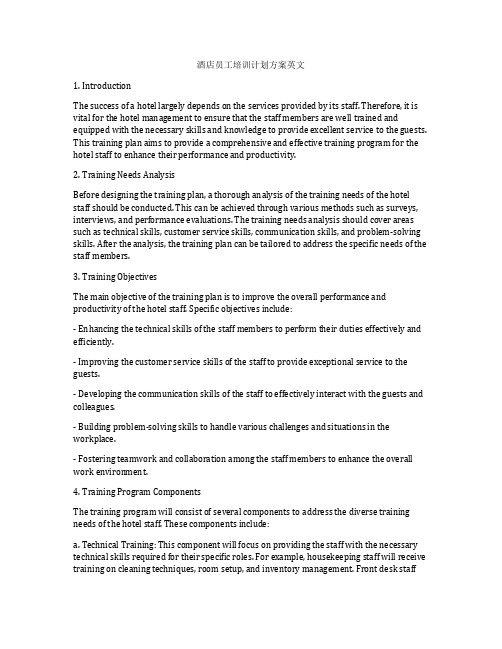
酒店员工培训计划方案英文1. IntroductionThe success of a hotel largely depends on the services provided by its staff. Therefore, it is vital for the hotel management to ensure that the staff members are well trained and equipped with the necessary skills and knowledge to provide excellent service to the guests. This training plan aims to provide a comprehensive and effective training program for the hotel staff to enhance their performance and productivity.2. Training Needs AnalysisBefore designing the training plan, a thorough analysis of the training needs of the hotel staff should be conducted. This can be achieved through various methods such as surveys, interviews, and performance evaluations. The training needs analysis should cover areas such as technical skills, customer service skills, communication skills, and problem-solving skills. After the analysis, the training plan can be tailored to address the specific needs of the staff members.3. Training ObjectivesThe main objective of the training plan is to improve the overall performance and productivity of the hotel staff. Specific objectives include:- Enhancing the technical skills of the staff members to perform their duties effectively and efficiently.- Improving the customer service skills of the staff to provide exceptional service to the guests.- Developing the communication skills of the staff to effectively interact with the guests and colleagues.- Building problem-solving skills to handle various challenges and situations in the workplace.- Fostering teamwork and collaboration among the staff members to enhance the overall work environment.4. Training Program ComponentsThe training program will consist of several components to address the diverse training needs of the hotel staff. These components include:a. Technical Training: This component will focus on providing the staff with the necessary technical skills required for their specific roles. For example, housekeeping staff will receive training on cleaning techniques, room setup, and inventory management. Front desk staffwill receive training on reservation systems, check-in procedures, and handling guest inquiries.b. Customer Service Training: This component will focus on enhancing the customer service skills of the staff members. Training will cover areas such as empathy, active listening, problem-solving, and conflict resolution. Role-playing exercises and case studies will be used to simulate real-life customer service scenarios and improve the staff's ability to handle various situations.c. Communication Skills Training: Effective communication is crucial in the hospitality industry. This component will focus on improving the verbal and non-verbal communication skills of the staff members. Training will cover areas such as professional etiquette, greetings, and handling guest complaints. The training will also emphasize the use of appropriate language and tone in different situations.d. Problem-Solving Skills Training: This component will focus on equipping the staff members with the skills to identify, analyze, and solve problems in the workplace. Training will cover areas such as critical thinking, decision-making, and creative problem-solving techniques. Case studies and group discussions will be used to improve the staff's problem-solving abilities.e. Team Building Training: This component will focus on fostering teamwork and collaboration among the staff members. Training activities such as team-building exercises, group projects, and role-playing games will be used to enhance the staff's ability to work effectively as a team and support each other.5. Training MethodsThe training program will utilize a variety of training methods to cater to the different learning styles of the staff members. These methods include:- Classroom Training: This traditional training method will be used to deliver theoretical knowledge and concepts. It will also provide an opportunity for interactive discussions and group activities.- On-the-Job Training: This method will be used to provide hands-on experience and practical skills training. Staff members will shadow experienced colleagues and receive direct guidance and feedback.- E-Learning: This method will be used to deliver training content through online platforms. It will provide flexibility for the staff to access training materials at their own pace and convenience.- Workshops and Seminars: These interactive sessions will be organized to dive deeper into specific topics and allow the staff to engage in discussions and share experiences.- Role-Playing and Simulation: These activities will be used to simulate real-life scenarios and provide a practical environment for the staff to apply their learning and improve their skills.6. Training ScheduleThe training program will be organized into a comprehensive schedule to ensure that all staff members receive the necessary training within a specific timeframe. The schedule will be designed to minimize disruption to the hotel's operations and accommodate the availability of the staff members.The training schedule will include the following components:- Orientation Training: New staff members will undergo an orientation program to familiarize them with the hotel's policies, procedures, and culture.- Department-specific Training: Staff members will receive training tailored to their specific roles and responsibilities. This training will focus on the technical skills and knowledge required for their respective departments.- Ongoing Training: Continuous training sessions will be organized to address new developments, new procedures, and emerging trends in the hospitality industry.- Evaluation and Feedback: Regular evaluations will be conducted to assess the effectiveness of the training program and gather feedback from the staff members. This feedback will be used to improve the training program and address any training gaps.7. Training ResourcesTo ensure the success of the training program, adequate resources will be allocated to support the training activities. These resources include:- Training Materials: The hotel will provide training materials such as manuals, handbooks, and e-learning modules to support the training program.- Trainers: Experienced trainers and subject matter experts will be engaged to deliver the training sessions and provide guidance to the staff members.- Facilities: Suitable training venues and facilities will be provided to accommodate the training activities, including classrooms, training rooms, and audio-visual equipment.- Budget: Sufficient budget will be allocated to support the training program, including the cost of trainers, materials, and facilities.- Time: Adequate time will be allocated for the staff members to participate in training activities without compromising their regular job responsibilities.8. Training EvaluationThe effectiveness of the training program will be evaluated through various methods such as pre and post-training assessments, feedback surveys, and performance evaluations. The evaluation will assess the impact of the training program on the staff's knowledge, skills, and performance. Any training gaps or areas for improvement will be identified and addressed to enhance the effectiveness of the training program.In conclusion, the success of a hotel depends on the quality of its staff. By implementing a comprehensive and effective training plan, the hotel can ensure that its staff members are well-equipped to provide exceptional service to the guests. This training plan aims to enhance the technical skills, customer service skills, communication skills, and problem-solving skills of the hotel staff to improve their overall performance and productivity. With the proper training and support, the hotel staff can contribute to the success and reputation of the hotel.。
宾馆前台英语培训计划
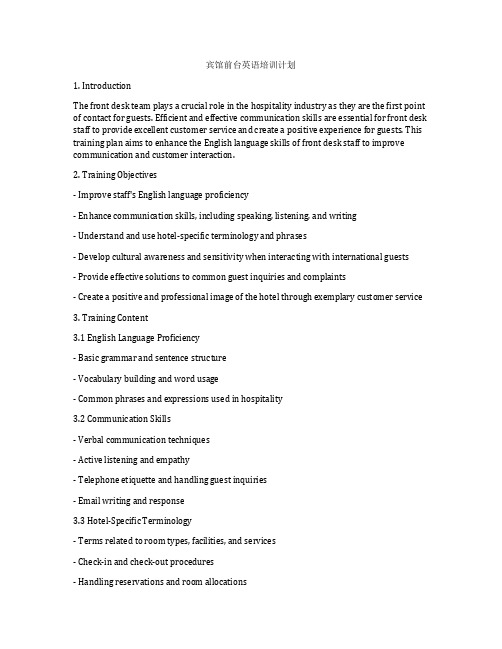
宾馆前台英语培训计划1. IntroductionThe front desk team plays a crucial role in the hospitality industry as they are the first point of contact for guests. Efficient and effective communication skills are essential for front desk staff to provide excellent customer service and create a positive experience for guests. This training plan aims to enhance the English language skills of front desk staff to improve communication and customer interaction.2. Training Objectives- Improve staff's English language proficiency- Enhance communication skills, including speaking, listening, and writing- Understand and use hotel-specific terminology and phrases- Develop cultural awareness and sensitivity when interacting with international guests- Provide effective solutions to common guest inquiries and complaints- Create a positive and professional image of the hotel through exemplary customer service 3. Training Content3.1 English Language Proficiency- Basic grammar and sentence structure- Vocabulary building and word usage- Common phrases and expressions used in hospitality3.2 Communication Skills- Verbal communication techniques- Active listening and empathy- Telephone etiquette and handling guest inquiries- Email writing and response3.3 Hotel-Specific Terminology- Terms related to room types, facilities, and services- Check-in and check-out procedures- Handling reservations and room allocations3.4 Cultural Awareness- Recognizing cultural differences and customs- Adapting communication styles for international guests- Understanding and respecting diverse cultural norms3.5 Customer Service- Dealing with guest complaints and resolving issues- Providing personalized service and anticipating guest needs- Creating a welcoming and positive atmosphere at the front desk4. Training Methods4.1 Classroom training- Interactive lessons focusing on grammar, vocabulary, and hotel-specific terminology- Role-playing exercises to simulate guest interactions and common scenarios- Group discussions and presentations to practice communication skills- Vocabulary games and quizzes to reinforce learning4.2 On-the-job training- Shadowing experienced front desk staff to observe real-life interactions- Handling guest inquiries and check-in/out procedures under supervision- Receiving feedback and guidance from trainers and supervisors- Practicing language skills in daily guest interactions4.3 E-learning- Online language proficiency courses and tutorials- Interactive modules on customer service and cultural awareness- Virtual simulations of guest interactions and case studies5. Training ScheduleThe training program will be conducted over a period of 3 months to ensure comprehensive learning and skill development. The schedule will include a combination of classroom training, on-the-job coaching, and e-learning modules.Month 1:- Basic English language and grammar- Vocabulary building and hotel-specific terminology- Introduction to customer service and communication skillsMonth 2:- Advanced communication skills and active listening techniques- Cultural awareness and sensitivity training- Handling guest inquiries and complaintsMonth 3:- Role-playing exercises and simulations- Final assessments and evaluations- Continuous on-the-job coaching and language practice6. Evaluation and FeedbackRegular assessments and evaluations will be conducted to monitor the progress of front desk staff throughout the training program. Feedback from trainers, supervisors, and guest interactions will be used to identify strengths and areas for improvement. This will enable personalized coaching and support to ensure that each staff member achieves the desired level of language proficiency and customer service skills.7. Resources and Support- Language learning materials and resources- Online courses and e-learning platforms- Coaching and mentoring from experienced staff and trainers- Regular feedback and performance evaluations8. ConclusionThe front desk English training plan aims to equip the front desk staff with the essential language skills and communication techniques required to provide exceptional customer service. By improving their English proficiency and cultural awareness, staff will be better equipped to handle guest interactions, resolve issues, and create a positive experience for all guests. This training program will contribute to the overall success and image of the hotel, leading to higher guest satisfaction and loyalty.。
酒店英语培训方案计划

酒店英语培训方案计划1. IntroductionIn the hospitality industry, a good command of English is essential for hotel staff to effectively communicate with guests and provide a high level of customer service. Therefore, it is crucial for hotels to invest in English training programs for their employees. This training program plan aims to improve the English proficiency of hotel staff members, including front desk receptionists, housekeeping staff, waiters/waitresses, and managers.2. Training ObjectivesThe primary objectives of the training program are:- To improve the overall English language proficiency of hotel staff- To enhance staff members' ability to communicate with guests effectively- To provide staff with specialized vocabulary and language skills related to their specific job functions- To ensure that staff members can confidently handle various customer service situations in English- To create a positive and professional image for the hotel through excellent English communication3. Training ContentThe training program will consist of the following components:a. General English Language SkillsThis component will cover basic language skills such as grammar, vocabulary, pronunciation, and listening comprehension. Focus will be placed on improving everyday English communication for staff members.b. Hotel-specific English VocabularyStaff members will be taught specialized hotel industry vocabulary related to their job functions. For instance, front desk receptionists will learn about hotel room types, amenities, and check-in/check-out procedures, while housekeeping staff will learn about cleaning supplies, room service, and guest requests.c. Customer Service ScenariosThis component will involve role-playing exercises and simulations to help staff members practice handling various customer service scenarios in English. This will include dealing with complaints, taking orders, providing information, and resolving issues.d. Business English CommunicationManagers and other senior staff members will be given additional training in business English communication, including writing professional emails, giving presentations, and participating in meetings.e. Cultural Awareness and EtiquetteStaff members will also be provided with cultural awareness training to help them understand the customs and etiquette of international guests. This may include topics such as greetings, gestures, and dining customs.4. Training MethodsThe training program will utilize a variety of methods to cater to different learning styles and preferences. These may include:- Classroom-based instruction with a qualified English instructor- Interactive group activities and discussions- Role-playing exercises and simulations- Multimedia materials such as videos, audio recordings, and online resources- On-the-job training and practical applications- Individual self-study assignments and exercises5. Training ScheduleThe training program will be conducted over a period of 12 weeks, with sessions held twice a week for 2-3 hours each. The schedule will be flexible to accommodate different shift timings for staff members.6. Evaluation and MonitoringTo ensure the effectiveness of the training program, regular evaluations will be conducted to assess staff members' progress in English proficiency. This may include quizzes, tests, and performance evaluations in real-time customer service situations. Feedback from both staff members and guests will also be taken into account to assess the impact of the training program.7. Training Materials and ResourcesThe hotel will provide staff members with the necessary training materials and resources, including textbooks, workbooks, audiovisual materials, and access to online learning platforms. Staff members will also be encouraged to use these resources for self-study and practice outside of the training sessions.8. Incentives and RecognitionTo encourage staff members' participation and commitment to the training program, the hotel may offer incentives such as bonuses, promotions, or recognition awards for those who show significant improvement in their English language skills. This will help create a positive and supportive learning environment for the staff.9. ConclusionA well-designed English training program is essential for ensuring that hotel staff can effectively communicate with guests and provide excellent customer service. By investing in the English proficiency of its employees, a hotel can enhance its reputation and attract more international guests. This training program plan aims to provide a comprehensive and effective approach to improving the English language skills of hotel staff members, ultimately benefiting both the staff and the hotel as a whole.。
关于酒店英语的年度培训计划

千里之行,始于足下。
关于酒店英语的年度培训计划酒店英语年度培训计划1. 培训目标:提高员工的酒店英语沟通能力和专业知识,提升客户服务质量,增加客户满意度。
2. 培训对象:所有酒店员工,包括前台接待员、客房服务员、餐厅服务员、销售人员等。
3. 培训内容:(1) 酒店英语基础知识:- 基本问候和介绍- 预订房间和确认订单- 客房设施和服务介绍- 餐厅菜单和点菜- 投诉处理和客户满意解决(2) 酒店业务知识:- 酒店组织架构和岗位职责- 酒店房型和设施介绍- 酒店服务标准和流程- 酒店销售和市场营销知识- 酒店客户服务技巧和沟通技巧(3) 案例分析和角色扮演:- 使用真实的案例和场景,进行角色扮演练习第1页/共3页锲而不舍,金石可镂。
- 模拟客户对员工的各种情况进行应对(4) 听力和口语训练:- 练习听懂酒店客户的需求和问题- 练习用符合客户期望的语言回答问题和解决问题(5) 培训材料和资源:- 提供酒店英语学习书籍、CD和在线资源,供员工自学和复习- 提供酒店英语学习小组,供员工相互交流和练习4. 培训形式:(1) 线上学习:通过在线平台提供视频教学、学习资料下载和在线练习等形式,方便员工自主学习和随时随地学习。
(2) 面对面培训:定期安排专业酒店英语培训师进行集中培训,提供实际案例分析和角色扮演的练习,及时解答员工的问题和困惑。
5. 培训考核:(1) 在线测验:每个培训阶段结束后,进行在线测验考核员工对所学内容的掌握程度,并根据测验结果进行个别辅导和指导。
(2) 考试评估:设立酒店英语考试,通过考试来评估员工的酒店英语水平和培训效果,并提供相应的成绩和证书。
6. 培训周期和时间安排:(1) 培训周期:一年,分为四个阶段,每个阶段为三个月。
千里之行,始于足下。
(2) 时间安排:每个阶段的培训时间为10天,每天为八小时,具体时间根据员工的班次和工作安排进行合理调整。
7. 培训效果跟踪和反馈:(1) 培训效果跟踪:培训结束后进行员工满意度调查和客户反馈收集,以评估培训效果和改进培训内容。
酒店培训英语计划方案范文
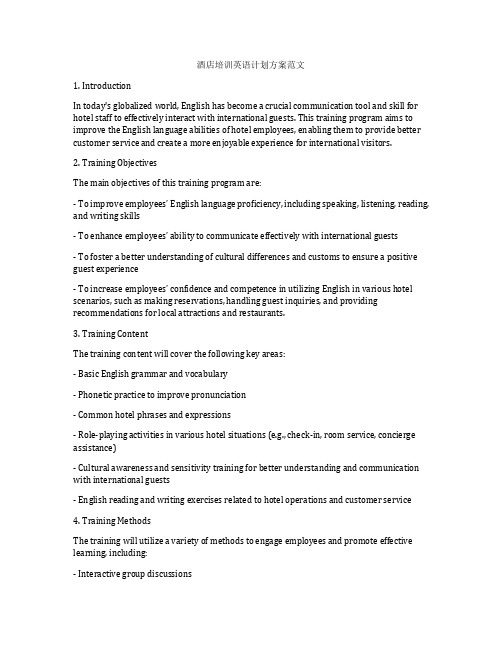
酒店培训英语计划方案范文1. IntroductionIn today's globalized world, English has become a crucial communication tool and skill for hotel staff to effectively interact with international guests. This training program aims to improve the English language abilities of hotel employees, enabling them to provide better customer service and create a more enjoyable experience for international visitors.2. Training ObjectivesThe main objectives of this training program are:- To improve employees’ English language proficien cy, including speaking, listening, reading, and writing skills- To enhance employees’ ability to communicate effectively with international guests- To foster a better understanding of cultural differences and customs to ensure a positive guest experience- To increase employees’ confidence and competence in utilizing English in various hotel scenarios, such as making reservations, handling guest inquiries, and providing recommendations for local attractions and restaurants.3. Training ContentThe training content will cover the following key areas:- Basic English grammar and vocabulary- Phonetic practice to improve pronunciation- Common hotel phrases and expressions- Role-playing activities in various hotel situations (e.g., check-in, room service, concierge assistance)- Cultural awareness and sensitivity training for better understanding and communication with international guests- English reading and writing exercises related to hotel operations and customer service 4. Training MethodsThe training will utilize a variety of methods to engage employees and promote effective learning, including:- Interactive group discussions- Language games and activities- Role-playing exercises- Audio-visual materials- Practical, on-the-job language practice with native English speakers, such as mock guest interactions5. Training ScheduleThe training program will be conducted over a period of three months, with weekly sessions of two hours each. The schedule will be as follows:- Week 1-4: Basic English grammar and vocabulary- Week 5-8: Phonetic practice and speaking exercises- Week 9-12: Role-playing activities and cultural awareness training6. Evaluation and AssessmentRegular assessments will be conducted to evaluate employees’ progress and identify areas for improvement. The assessments will include written tests, oral presentations, and practical exercises. Employees who demonstrate significant improvement and proficiency in English will be recognized and rewarded.7. Training ResourcesThe training program will require various resources to support effective learning, including: - Textbooks and reference materials- Audio-visual equipment- Language learning software or apps- Native English speakers as guest trainers or language partners8. Training FacilitatorsThe training will be conducted by qualified language instructors and trainers, as well as native English speakers who can provide practical insight and guidance.9. Feedback and Continuous ImprovementFeedback from employees and management will be solicited throughout the training program to identify areas for improvement and ensure that the training meets the needs of the hotel and its staff. Continuous improvement and refinement of the training content and methods will be emphasized.10. ConclusionThis training program aims to equip hotel employees with the necessary English language skills and cultural awareness to better serve international guests and enhance the overall guest experience. By investing in the language proficiency and communication abilities of its staff, the hotel will be able to attract and retain international clientele and maintain a competitive edge in the global hospitality industry.In conclusion, providing comprehensive English training for hotel staff can greatly benefit both the employees and the hotel itself. It can lead to improved customer satisfaction, increased guest loyalty, and a more positive brand image. By investing in English language training, hotels can better meet the needs of international guests and create a more welcoming and inclusive environment.。
酒店英语培训方案(合集5篇)
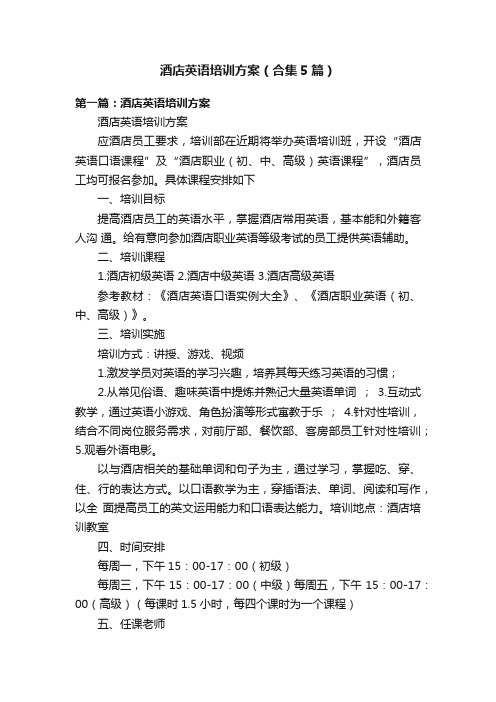
酒店英语培训方案(合集5篇)第一篇:酒店英语培训方案酒店英语培训方案应酒店员工要求,培训部在近期将举办英语培训班,开设“酒店英语口语课程”及“酒店职业(初、中、高级)英语课程”,酒店员工均可报名参加。
具体课程安排如下一、培训目标提高酒店员工的英语水平,掌握酒店常用英语,基本能和外籍客人沟通。
给有意向参加酒店职业英语等级考试的员工提供英语辅助。
二、培训课程1.酒店初级英语2.酒店中级英语3.酒店高级英语参考教材:《酒店英语口语实例大全》、《酒店职业英语(初、中、高级)》。
三、培训实施培训方式:讲授、游戏、视频1.激发学员对英语的学习兴趣,培养其每天练习英语的习惯;2.从常见俗语、趣味英语中提炼并熟记大量英语单词;3.互动式教学,通过英语小游戏、角色扮演等形式寓教于乐;4.针对性培训,结合不同岗位服务需求,对前厅部、餐饮部、客房部员工针对性培训;5.观看外语电影。
以与酒店相关的基础单词和句子为主,通过学习,掌握吃、穿、住、行的表达方式。
以口语教学为主,穿插语法、单词、阅读和写作,以全面提高员工的英文运用能力和口语表达能力。
培训地点:酒店培训教室四、时间安排每周一,下午15:00-17:00(初级)每周三,下午15:00-17:00(中级)每周五,下午15:00-17:00(高级)(每课时1.5小时,每四个课时为一个课程)五、任课老师由培训部在酒店范围内筛选三至四名培训老师(英语六级以上),并申请相关培训津贴(100元/课时)。
六、考核方式1.课堂参与度占20%;出勤占10%。
2.小组演练占20%,自行选择场景对话,上台表演。
5分钟/3人组。
3.闭卷考试占50%。
(考试合格员工颁发证书,并可参加下一阶段英语培训。
取得高级证书员工,可享受50元/月语言津贴。
)七、其他1.各部门负责人安排好部门员工班次,尽量使每个报名员工都能参加培训。
2.培训部制定英语考核奖惩制度,并于员工考核后,将获得证书员工名单张贴在员工宣传栏上。
酒店前厅英语培训计划
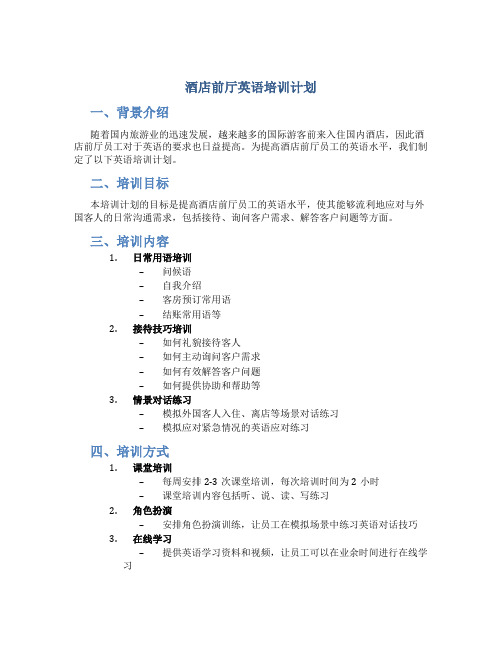
酒店前厅英语培训计划一、背景介绍随着国内旅游业的迅速发展,越来越多的国际游客前来入住国内酒店,因此酒店前厅员工对于英语的要求也日益提高。
为提高酒店前厅员工的英语水平,我们制定了以下英语培训计划。
二、培训目标本培训计划的目标是提高酒店前厅员工的英语水平,使其能够流利地应对与外国客人的日常沟通需求,包括接待、询问客户需求、解答客户问题等方面。
三、培训内容1.日常用语培训–问候语–自我介绍–客房预订常用语–结账常用语等2.接待技巧培训–如何礼貌接待客人–如何主动询问客户需求–如何有效解答客户问题–如何提供协助和帮助等3.情景对话练习–模拟外国客人入住、离店等场景对话练习–模拟应对紧急情况的英语应对练习四、培训方式1.课堂培训–每周安排2-3次课堂培训,每次培训时间为2小时–课堂培训内容包括听、说、读、写练习2.角色扮演–安排角色扮演训练,让员工在模拟场景中练习英语对话技巧3.在线学习–提供英语学习资料和视频,让员工可以在业余时间进行在线学习五、培训考核1.日常练习–员工需要每天完成一定量的英语练习,包括听、说、读、写练习2.模拟考核–每两周进行一次模拟考核,考核内容包括日常用语、接待技巧和情景对话练习六、培训效果评估1.成绩评定–根据员工的日常练习表现和考核成绩评定培训效果–对成绩优秀的员工给予奖励2.反馈调查–每月进行一次培训效果调查,收集员工对培训计划的反馈意见,不断改进培训内容和方式七、总结通过本英语培训计划,我们相信酒店前厅员工的英语水平将得到显著提高,能够更好地满足国际客人的需求,提升酒店服务质量,为酒店的发展打下坚实的基础。
希望每位员工在英语培训中取得好成绩!。
酒店英语基础沟通培训
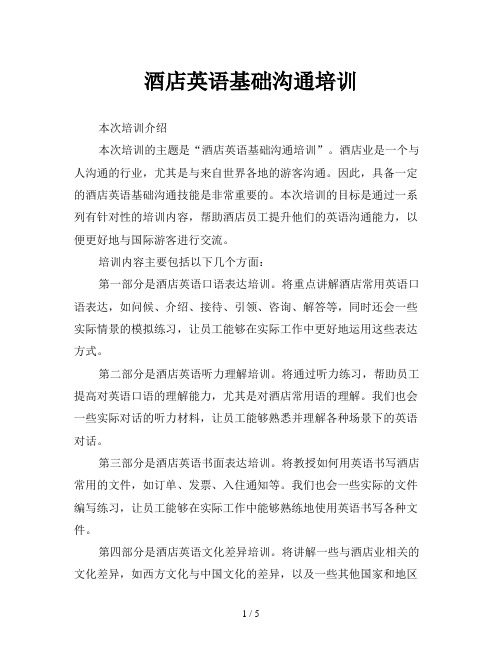
酒店英语基础沟通培训本次培训介绍本次培训的主题是“酒店英语基础沟通培训”。
酒店业是一个与人沟通的行业,尤其是与来自世界各地的游客沟通。
因此,具备一定的酒店英语基础沟通技能是非常重要的。
本次培训的目标是通过一系列有针对性的培训内容,帮助酒店员工提升他们的英语沟通能力,以便更好地与国际游客进行交流。
培训内容主要包括以下几个方面:第一部分是酒店英语口语表达培训。
将重点讲解酒店常用英语口语表达,如问候、介绍、接待、引领、咨询、解答等,同时还会一些实际情景的模拟练习,让员工能够在实际工作中更好地运用这些表达方式。
第二部分是酒店英语听力理解培训。
将通过听力练习,帮助员工提高对英语口语的理解能力,尤其是对酒店常用语的理解。
我们也会一些实际对话的听力材料,让员工能够熟悉并理解各种场景下的英语对话。
第三部分是酒店英语书面表达培训。
将教授如何用英语书写酒店常用的文件,如订单、发票、入住通知等。
我们也会一些实际的文件编写练习,让员工能够在实际工作中能够熟练地使用英语书写各种文件。
第四部分是酒店英语文化差异培训。
将讲解一些与酒店业相关的文化差异,如西方文化与中国文化的差异,以及一些其他国家和地区的文化特点。
通过了解这些文化差异,员工能够更好地理解和尊重不同文化背景的游客,提高服务质量和顾客满意度。
本次培训将采用互动式教学方式,包括讲解、示范、练习和互动讨论等。
将一些实际案例和情景模拟,让员工能够在实际工作中更好地应用所学的英语沟通技能。
通过本次培训,我们相信酒店员工的英语沟通能力将得到有效的提升,为他们更好的服务质量和顾客体验。
希望每位员工都能积极参与,充分利用这次培训机会,提升自己的英语沟通能力。
谢谢!以下是本次培训的主要内容一、培训背景随着全球化的不断深入,酒店业作为服务行业的代表,面临着越来越高的国际化标准和要求。
作为酒店员工,与来自世界各地的游客进行有效沟通是必不可少的技能。
然而,我们发现在实际工作中,很多员工在英语沟通方面存在一定的困难,这不仅影响了服务质量,也影响了顾客的满意度。
酒店商务英语培训计划

酒店商务英语培训计划1. IntroductionWith the importance of the global hospitality industry, there is an increasing need for hotel staff to be proficient in business English in order to communicate effectively with international guests, business partners and colleagues. This training program is specifically designed for hotel employees to improve their business English skills and enhance their professional communication abilities. The program aims to provide comprehensive training in various aspects of business English, including verbal and written communication, customer service, and business etiquette.2. Objectives- To improve employees’ English language proficiency in business communication- To enhance employees’ customer service skills in English- To de velop employees’ understanding of business etiquette and communication norms- To increase employees’ confidence in using English in the workplace- To support employees in creating a more welcoming and professional environment for international guests3. Target ParticipantsThe training program is open to all hotel employees who are required to communicate in English as a part of their daily work, including front desk staff, concierge, food and beverage personnel, sales and marketing team, and management staff.4. Training TopicsThe training program will cover a range of business English topics, including but not limited to:- Business communication skills: Effective speaking, listening, and writing skills in a business context- Customer service in English: Communicating effectively with international guests, handling complaints and requests, and providing exceptional service- Business etiquette: Understanding and practicing appropriate business communication norms, including professional email writing, phone etiquette, and meeting conduct- Industry-specific vocabulary: Terminology and phrases used in the hospitality industry, such as hotel services, amenities, and guest interactions- Cultural awareness: Understanding different cultural norms and customs that may impact business communication and relationships- Role-play and practical exercises: Simulated scenarios to practice and improve real-life business English conversations and interactions.5. Training MethodsThe training program will utilize a variety of interactive and engaging teaching methods to ensure effective learning, including:- Classroom-based instruction: Interactive lectures and discussions led by experienced language trainers and business professionals- Role-playing exercises: Simulated scenarios to practice real-life business English conversations and interactions- Group activities and discussions: Collaborative activities to encourage teamwork, problem-solving, and communication skills- Language lab sessions: Listening and speaking practice in a controlled environment to develop fluency and pronunciation- Business case studies: Real-world examples and case studies to illustrate business communication challenges and best practices- Language learning software and resources: Electronic resources and tools to support self-study and language practice outside of the classroom.6. Training ScheduleThe training program will be conducted over a period of 12 weeks, consisting of three-hour sessions held twice a week. The schedule will be designed to accommodate the work shifts of the hotel employees to ensure minimal disruption to their regular duties.Week 1-2: Business Communication Skills- Verbal communication: Effective speaking and listening skills in a business context- Written communication: Professional email writing and business correspondence- Business vocabulary and language usageWeek 3-4: Customer Service in English- Understanding international guests’ needs and expectations- Handling complaints and requests in English- Providing exceptional service through effective communicationWeek 5-6: Business Etiquette- Phone etiquette in a business setting- Meeting conduct and professional etiquette- Cross-cultural communication and understandingWeek 7-8: Industry-specific Vocabulary- Hotel services and amenities- Guest interactions and customer care phrases- Role-play and practical exercises for real-life scenariosWeek 9-10: Cultural Awareness- Understanding different cultural norms and customs in business- Adapting communication styles to suit different cultural backgrounds- Developing cultural sensitivity and respect in business interactionsWeek 11-12: Role-play and Practical Exercises- Simulated scenarios to practice and improve real-life business English conversations and interactions- Review of key concepts and skills- Final assessment and feedback session.7. Training MaterialsThe training program will provide the necessary materials and resources to support learning and practice, including:- Textbooks and workbooks with relevant business English content- Handouts, worksheets, and practice exercises for in-class activities- Language learning software and electronic resources for self-study- Audio and video materials for listening and speaking practice- Business case studies and real-world examples.8. Assessment and CertificationParticipants will be assessed throughout the training program through participation, assignments, and final assessments. A certificate of completion will be awarded to participants who successfully complete the program and demonstrate proficiency in business English communication skills.9. Follow-up SupportAfter the completion of the training program, participants will receive ongoing support and resources to continue practicing and improving their business English skills. This may include access to online learning platforms, language exchange programs, and additional workshops or refresher courses.10. ConclusionThe Hotel Business English Training Program aims to empower hotel employees with the necessary language and communication skills to excel in their professional roles and provide exceptional service to international guests. Through comprehensive training in business English, customer service, and cultural awareness, employees will be better equipped to communicate effectively, build strong international relationships, and create a welcoming environment for guests from around the world. This program will not only benefit individual employees in their professional development, but also contribute to the overall success and reputation of the hotel as a global hospitality provider.。
酒店前厅英语培训计划

酒店前厅英语培训计划1. IntroductionWelcome to our Hotel Front Office English Training Program! In this program, we aim to provide our front office staff with the necessary skills and knowledge to effectively communicate with English-speaking guests, handle various front office tasks, and provide excellent customer service. This training program will cover a wide range of topics including basic English communication, handling reservations, check-in and check-out procedures, dealing with guest inquiries and complaints, and more. We believe that by improving our staff's English communication skills, we will be able to enhance the overall guest experience and satisfaction.2. Program Objectives- To improve staff's English communication skills- To enhance staff's ability to handle front office tasks- To provide staff with the necessary knowledge and skills to handle guest inquiries and complaints effectively- To improve staff's ability to provide excellent customer service3. Training StructureThe training program will be divided into several modules, each covering different aspects of front office operations and English communication. The modules will include both theoretical and practical components, with plenty of opportunities for role-playing, interactive exercises, and real-life scenarios. The training will be conducted by experienced trainers and will be tailored to the specific needs of our front office staff.Module 1: Basic English CommunicationThis module will cover basic English vocabulary, grammar, and phrases that are commonly used in front office operations. Staff will learn how to greet guests, introduce themselves, ask and answer questions, and handle simple conversations in English.Module 2: Handling ReservationsIn this module, staff will learn how to take reservations over the phone, via email, and in person. They will also learn how to confirm reservations, check room availability, and handle special requests from guests. This module will also cover basic English phrases and vocabulary related to reservations and room types.Module 3: Check-in and Check-out ProceduresStaff will learn how to welcome guests, verify their identification and reservation details, and complete the check-in process. They will also learn how to handle payments, issue room keys, and provide guests with information about hotel amenities and services. For check-out procedures, staff will learn how to handle final payments, issue invoices, and bid farewell to guests.Module 4: Dealing with Guest Inquiries and ComplaintsThis module will focus on teaching staff how to effectively handle guest inquiries and complaints in English. Staff will learn how to listen actively, empathize with guests, and provide appropriate solutions to their issues. They will also learn how to use polite and professional language when dealing with guest complaints.Module 5: Providing Excellent Customer ServiceIn this module, staff will learn how to provide exceptional customer service to English-speaking guests. They will learn how to anticipate and exceed guest expectations, handle special requests, and create a positive and memorable experience for guests.4. Training MethodsThe training program will make use of a variety of training methods and techniques to ensure that staff is engaged and able to apply what they have learned in their daily tasks. The methods will include:- Interactive group discussions- Role-playing exercises- Real-life scenarios and case studies- Multimedia presentations- Practical demonstrations- On-the-job coaching and mentoringWe believe that the combination of these training methods will help our staff to learn effectively and apply their new skills and knowledge to their daily work.5. Training ScheduleThe training program will be conducted over a period of 4 weeks, with each module being covered in one week. The training will be conducted during staff's off-peak hours to minimize disruption to their daily tasks. The schedule will be communicated to staff in advance to ensure maximum participation and attendance.6. Evaluation and FeedbackThroughout the training program, staff will be evaluated on their understanding and application of the training content through quizzes, practical assessments, and feedback sessions. Staff will also be encouraged to provide feedback on the training program to help us improve and tailor future training programs to their needs.7. ConclusionWe are excited to roll out this Hotel Front Office English Training Program to our staff and believe that it will greatly enhance our staff's ability to communicate effectively with English-speaking guests and provide excellent customer service. We are committed to ongoing training and development for our staff and look forward to seeing the positive impact of this program on the overall guest experience. Thank you for your participation and dedication to improving your skills!。
酒店简单英语培训计划

酒店简单英语培训计划IntroductionWelcome to the hotel training plan! This plan has been designed to provide our staff with the necessary skills and knowledge to excel in their roles and provide excellent service to our guests. The plan consists of a variety of training modules that cover the important aspects of working in a hotel, including customer service, communication, and problem-solving.Training ObjectivesThe main objectives of the hotel training plan are:- To ensure that all staff have a thorough understanding of their roles and responsibilities within the hotel- To provide staff with the necessary skills to deliver excellent customer service- To improve communication and teamwork within the hotel- To equip staff with problem-solving techniques to handle a variety of situations that may arise in the hotel- To enhance the overall guest experience and satisfactionTraining ModulesThe training plan is divided into several modules, each focused on a different aspect of working in a hotel. The modules are as follows:1. Customer Service2. Communication3. Problem-Solving4. Hotel Operations5. Safety and Security6. Work EthicsEach module will consist of both theoretical and practical training to ensure that staff not only understand the concepts but also know how to implement them in their daily work. Module 1: Customer ServiceCustomer service is a crucial aspect of working in a hotel, as it directly impacts the guest experience and satisfaction. In this module, staff will learn about the key principles of customer service, including:- Understanding and meeting customer needs- Managing customer expectations- Dealing with customer complaints- Creating a positive and welcoming atmosphereThe practical aspect of this module will involve role-playing exercises where staff will have the opportunity to practice their customer service skills in various scenarios.Module 2: CommunicationEffective communication is essential for smooth operations and teamwork within the hotel. In this module, staff will learn about the different forms of communication, including verbal, non-verbal, and written communication. The module will also cover:- Active listening- Conflict resolution- Team communication- Communication with guestsRole-playing exercises and group discussions will be used to reinforce the concepts learned in this module.Module 3: Problem-SolvingWorking in a hotel often involves dealing with unexpected challenges and situations. In this module, staff will learn problem-solving techniques that will help them effectively handle a variety of issues. The module will cover:- Identifying and analyzing problems- Generating and evaluating solutions- Making decisions- Implementing and evaluating solutionsCase studies and group activities will be used to provide staff with practical experience in problem-solving.Module 4: Hotel OperationsThis module will provide staff with a comprehensive understanding of the hotel's operations, including:- Front desk operations- Housekeeping- Food and beverage- Room service- Reservations and bookingsStaff will receive both theoretical and practical training in each of these areas to ensure that they are familiar with the hotel's operations.Module 5: Safety and SecuritySafety and security are top priorities in a hotel, and staff need to be well-trained in these areas. In this module, staff will learn about:- Fire safety- Emergency procedures- Security protocols- First aidPractical training exercises, such as fire drills and first aid demonstrations, will be used to ensure that staff are fully prepared to handle any safety or security situation.Module 6: Work EthicsThis module will focus on the importance of professionalism, integrity, and responsibility in the workplace. Staff will learn about:- Work ethics and values- Professional conduct- Time management- Workplace etiquetteRole-playing exercises and group discussions will be used to reinforce the importance of work ethics in the hotel.Training MethodsThe training plan will utilize a variety of methods to ensure that staff receive effective and engaging training. These methods will include:- Classroom training- Role-playing exercises- Group discussions- Case studies- Hands-on practical training- Presentations and demonstrationsEach training module will be delivered by experienced trainers who will provide staff with the necessary knowledge and skills to excel in their roles.Training ScheduleThe training plan will be divided into several sessions to ensure that staff receive thorough and comprehensive training. The sessions will be scheduled to accommodate staff members' work schedules and will be held in dedicated training rooms within the hotel.Evaluation and FeedbackAt the end of each training session, staff will have the opportunity to provide feedback on the training they have received. This feedback will be used to make any necessary improvements to the training plan and to ensure that staff are receiving the most effective training possible.ConclusionThe hotel training plan is designed to provide staff with the necessary skills and knowledge to excel in their roles and provide excellent service to our guests. By completing this training plan, staff will be well-prepared to handle the various aspects of working in a hotel and contribute to a positive and welcoming guest experience. We are confident that the training plan will help to enhance the skills and professionalism of our staff and improve the overall operation of the hotel. Thank you for your participation, and we look forward to seeing the positive impact of this training on our staff and our guests.。
客房部英语培训计划方案

客房部英语培训计划方案Training Title: Room Division Training Plan for Hotel Staff1. IntroductionThe room division in a hotel is an essential part of the overall operation. It encompasses a range of duties and responsibilities that are central to guest satisfaction and the hotel's reputation. This training plan is designed to enhance the skills and knowledge of the hotel staff within the room division, including front office, housekeeping, and reservations. By providing comprehensive training, we aim to improve staff performance, provide better guest experiences, and ultimately, increase the hotel's overall success.2. ObjectivesThe main objectives of this training plan are:- To improve the skills and knowledge of the front office staff, housekeeping staff, and reservations staff- To provide the staff with a clearer understanding of their roles and responsibilities within the room division- To enhance communication and teamwork among the staff within the room division- To improve customer service and customer satisfaction- To ensure that the hotel staff are competent in handling various situations and challenges within the room division3. Training ContentThe training plan will cover various areas within the room division, including:- Front Office Operations: This will include training on check-in and check-out procedures, guest relations, cashiering, and handling guest requests and complaints.- Housekeeping: This will include training on room cleaning procedures, laundry operations, amenities replenishment, and maintaining cleanliness and hygiene standards.- Reservations: This will include training on handling room bookings, managing room inventory, understanding various rates and packages, and using reservation systems effectively.4. Training MethodsThe training will be provided through a combination of methods, including:- Classroom training: This will involve theoretical sessions to provide an understanding of the concepts and procedures within the room division.- On-the-job training: This will involve practical sessions where staff will be able to apply their learning directly within their roles, under the supervision of experienced colleagues.- Role-playing and simulations: This will involve creating scenarios to allow staff to practice dealing with various guest situations and challenges.- Guest speakers: This will involve inviting industry professionals to share their insights and experiences with the staff.5. Training ScheduleThe training plan will be divided into modules, with each module focusing on a specific area within the room division. The schedule will be as follows:- Module 1: Front Office Operations (2 days)- Module 2: Housekeeping (2 days)- Module 3: Reservations (1 day)- Module 4: Communication and Teamwork (1 day)- Module 5: Customer Service (1 day)6. Training MaterialsTraining materials will be provided to the staff, including:- Manuals and handbooks- Visual aids and presentations- Case studies and scenarios- Training videos- Reference materials and resources7. EvaluationThe training plan will include regular evaluations to assess the staff's understanding and application of the training. This will involve:- Written assessments- Practical assessments- Role-playing exercises- Feedback forms8. Follow-up SupportAfter the completion of the training, follow-up support will be provided to the staff to ensure that they are able to apply their learning effectively within their roles. This will involve:- Regular feedback and coaching- Ongoing training sessions- Open communication channels for staff to seek guidance and support9. ConclusionThis training plan is designed to provide comprehensive training to the staff within the room division, with the aim of enhancing their skills, knowledge, and performance. By providing a structured and thorough training program, the hotel staff will be better equipped to meet the demands of their roles, provide exceptional guest experiences, and contribute to the overall success of the hotel.。
宾馆员工英语培训计划方案

宾馆员工英语培训计划方案1. IntroductionIn today's globalized world, the ability to communicate in English is essential for employees in the hospitality industry. As a result, our hotel has recognized the need to provide English training for our staff to ensure that they can effectively communicate with guests from all over the world. This training program aims to improve the English language skills of our employees, including front desk staff, housekeeping, and restaurant personnel, in order to enhance their ability to provide exceptional service to our international guests.2. ObjectivesThe main objectives of the English training program for hotel staff are as follows:- Improve employees' English language skills, including speaking, listening, reading, and writing.- Enhance employees' ability to communicate effectively with guests and colleagues in English.- Increase employees' confidence in using English in their day-to-day work.- Improve employees' knowledge of hospitality-related English vocabulary and phrases.- Provide employees with the opportunity to practice English in real-life hotel situations. 3. Target AudienceThe training program is designed for all hotel staff, including front desk agents, housekeeping attendants, food and beverage servers, and other customer-facing employees. It is open to employees of all English proficiency levels, from beginner to advanced.4. Training ScheduleThe training program will be conducted over a period of six months, with sessions held twice a week for two hours each. The sessions will be scheduled outside of regular working hours to minimize disruption to hotel operations. The specific schedule will be determined based on the availability of participants and trainers.5. Training ContentThe training program will cover a wide range of English language skills and topics relevant to the hospitality industry. The content will include the following:- Basic English grammar and vocabulary- Conversational English for hotel situations (checking in guests, taking orders, responding to guest requests, etc.)- Handling guest complaints and resolving issues in English- Cultural sensitivity and cross-cultural communication- English for specific hotel departments (front desk, housekeeping, food and beverage, etc.) - Role-play exercises and real-life scenarios- Listening and speaking practice- Reading and writing exercises- Hospitality-related English vocabulary and phrases6. Training MethodsThe training program will utilize a variety of teaching methods to ensure that participants have the opportunity to practice and improve their English language skills. These methods will include:- Interactive activities and games to engage participants and make learning fun- Group discussions and pair work to encourage speaking and listening practice- Role-plays and simulations of hotel situations to provide real-life practice- Listening exercises using audio recordings of hotel scenarios- Reading and writing assignments to improve comprehension and written communication - Use of multimedia resources, such as videos and online materials, to enhance learning7. Trainer QualificationsThe training program will be led by experienced, qualified English language trainers who have expertise in teaching English to non-native speakers. The trainers will have a background in language teaching and/or experience in the hospitality industry. They will be responsible for creating and delivering engaging, effective training sessions tailored to the needs of hotel staff.8. Evaluation and AssessmentThroughout the training program, participants will be evaluated on their progress and performance in order to track their improvement and identify areas for further development. The evaluation will include:- Pre-training assessment of participants' English language skills to gauge their starting level- Regular progress checks through quizzes, speaking assessments, and written assignments- Post-training assessment to measure participants' improvement in English proficiency- Feedback from participants and managers on the effectiveness of the training program 9. Support and ResourcesIn addition to the scheduled training sessions, participants will be provided with resources and support to help them continue improving their English language skills. These resources may include:- Access to online language learning platforms and materials- English language books and reference materials- Opportunities for additional practice and conversation in English- Ongoing support from trainers and colleagues10. ConclusionThe English training program for hotel staff aims to empower employees with the language skills and confidence needed to provide outstanding service to our international guests. By investing in the language proficiency of our staff, we are demonstrating our commitment to delivering exceptional hospitality and creating a positive experience for all guests. We believe that this program will not only benefit our employees, but also contribute to the overall success and reputation of our hotel. Thank you for your support and participation in this important initiative.。
关于酒店英语的年度培训计划

千里之行,始于足下。
关于酒店英语的年度培训计划酒店英语年度培训计划背景介绍:随着全球旅游业的快速发展,酒店行业也变得越来越国际化。
因此,酒店员工需要具备流利的英语沟通能力,以更好地为国际客户提供服务。
为了提高员工的英语水平,我们制定了以下酒店英语年度培训计划。
目标:1. 提高员工的英语口语表达能力,包括流利的沟通和商务谈判技巧。
2. 增加员工的英语听力和阅读能力,以更好地理解客户需求并满足其要求。
3. 培养员工的跨文化沟通能力,以更好地应对国际客户的期望和需求。
4. 提升员工在国际会议和活动中的表现能力,以增加酒店的国际影响力。
培训内容和计划:1. 英语口语培训:- 每周组织英语口语班,包括表达技巧和术语的学习。
- 组织模拟情境练习,如前台接待客户、预定餐厅和礼品等。
- 安排英语角活动,让员工有机会实践英语口语。
2. 商务英语培训:- 组织商务英语课程,涵盖商务信函写作、谈判技巧和演讲技巧等方面。
- 安排角色扮演练习,模拟商务谈判和会议的场景。
3. 英语听力和阅读培训:- 提供听力材料,如英语广播、英语新闻和英语电影,让员工提高听力理解能力。
第1页/共2页锲而不舍,金石可镂。
- 组织阅读训练,包括英语报纸、杂志和专业文章的阅读。
4. 跨文化沟通培训:- 组织文化交流活动,员工可以了解不同国家和地区的文化习俗。
- 提供跨文化沟通指导,如礼仪和文化差异的认识。
5. 国际会议和活动培训:- 协助员工参加国际会议和活动,并提供相关培训,如专业术语和礼节的学习。
6. 每月英语竞赛:- 组织每月的英语竞赛,鼓励员工积极参与和学习。
评估和反馈:1. 定期组织英语水平测试,以评估员工的学习成果。
2. 定期与员工进行反馈和讨论,了解培训进展和需求。
预期成果:1. 员工英语水平的提升,包括口语、听力、阅读和写作。
2. 员工在国际客户服务中更加自信和专业。
3. 员工跨文化沟通能力的增强,能够更好地理解和满足国际客户的需求。
《酒店英语培训版》教案
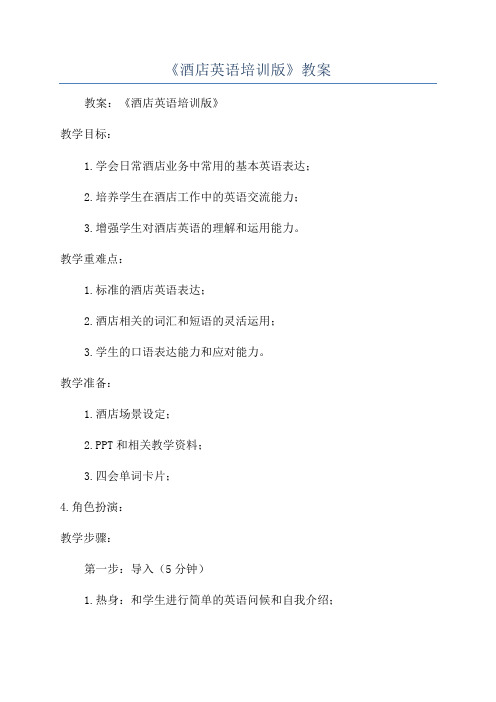
《酒店英语培训版》教案教案:《酒店英语培训版》教学目标:1.学会日常酒店业务中常用的基本英语表达;2.培养学生在酒店工作中的英语交流能力;3.增强学生对酒店英语的理解和运用能力。
教学重难点:1.标准的酒店英语表达;2.酒店相关的词汇和短语的灵活运用;3.学生的口语表达能力和应对能力。
教学准备:1.酒店场景设定;2.PPT和相关教学资料;3.四会单词卡片;4.角色扮演:教学步骤:第一步:导入(5分钟)1.热身:和学生进行简单的英语问候和自我介绍;2.学生自由讨论:请学生讨论并分享自己对酒店英语的了解和使用情况。
第二步:相关词汇和短语教学(20分钟)1.展示图片和单词:通过PPT展示图片和单词,教学酒店相关的词汇和短语;2.单词记忆:将相关单词和短语写在黑板上,学生听读并记忆;3.短语练习:请学生配对短语和图片,并运用短语进行对话练习。
第三步:口语表达练习(30分钟)1.角色扮演:将学生分成小组,每个小组扮演不同角色,如前台接待员、客人、服务员等,进行实际情景的角色扮演;2.实际情景对话:老师出示具体情景的图片,学生根据图片编写对话并表演出来;3.老师点评:老师对学生表演进行点评,指出优点和不足,并给予建议和改进意见。
第四步:问题讨论(15分钟)1.提问:老师提问学生关于酒店服务中可能遇到的问题,并鼓励学生积极参与讨论;2.学生讨论:学生分组讨论问题,并结合自己的经验提出解决方案;3.学生展示:每个小组选择一组代表进行讨论结果的展示。
第五步:总结和拓展(10分钟)1.指导学生总结学到的重点知识和技能;2.老师提供学习酒店英语的拓展资源和参考书目。
第六步:作业布置(5分钟)1.布置课后作业:要求学生尝试用英语写一篇关于酒店服务的短文,并要求使用课堂学到的酒店英语。
教学策略:1.互动策略:通过角色扮演和实际情景的讨论,学生能更好地理解和运用酒店英语;2.写作策略:通过让学生用英语写一篇关于酒店服务的短文,鼓励学生运用所学到的酒店英语进行写作。
- 1、下载文档前请自行甄别文档内容的完整性,平台不提供额外的编辑、内容补充、找答案等附加服务。
- 2、"仅部分预览"的文档,不可在线预览部分如存在完整性等问题,可反馈申请退款(可完整预览的文档不适用该条件!)。
- 3、如文档侵犯您的权益,请联系客服反馈,我们会尽快为您处理(人工客服工作时间:9:00-18:30)。
酒店英语培训方案
应酒店员工要求,培训部在近期将举办英语培训班,开设“酒店英语口语课程”及“酒店职业(初、中、高级)英语课程”,酒店员工均可报名参加。
具体课程安排如下
一、培训目标
提高酒店员工的英语水平,掌握酒店常用英语,基本能和外籍客人沟通。
给有意向参加酒店职业英语等级考试的员工提供英语辅助。
二、培训课程
1.酒店初级英语
2.酒店中级英语
3.酒店高级英语
参考教材:《酒店英语口语实例大全》、《酒店职业英语(初、中、高级)》。
三、培训实施
培训方式:讲授、游戏、视频
1.激发学员对英语的学习兴趣,培养其每天练习英语的习惯;
2.从常见俗语、趣味英语中提炼并熟记大量英语单词;
3.互动式教学,通过英语小游戏、角色扮演等形式寓教于乐;
4.针对性培训,结合不同岗位服务需求,对前厅部、餐饮部、客房部
员工针对性培训;
5.观看外语电影。
以与酒店相关的基础单词和句子为主,通过学习,掌握吃、穿、住、行的表达方式。
以口语教学为主,穿插语法、单词、阅读和写作,以全面提高员工的英文运用能力和口语表达能力。
培训地点:酒店培训教室
四、时间安排
每周一,下午15:00-17:00(初级)
每周三,下午15:00-17:00(中级)
每周五,下午15:00-17:00(高级)
(每课时1.5小时,每四个课时为一个课程)
五、任课老师
由培训部在酒店范围内筛选三至四名培训老师(英语六级以上),并申请相关培训津贴(100元/课时)。
六、考核方式
1.课堂参与度占20%;出勤占10%。
2.小组演练占20%,自行选择场景对话,上台表演。
5分钟/3人组。
3.闭卷考试占50%。
(考试合格员工颁发证书,并可参加下一阶段英语培训。
取得高级证书员工,可享受50元/月语言津贴。
)
七、其他
1.各部门负责人安排好部门员工班次,尽量使每个报名员工都能参加
培训。
2.培训部制定英语考核奖惩制度,并于员工考核后,将获得证书员工
名单张贴在员工宣传栏上。
